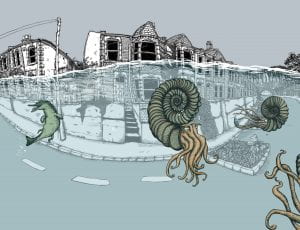The ERC-funded Greenhouse Earth System (TGRES) explored the climate, ecology and biogeochemical processes associated with ancient hot climates, potential analogues for our future. Ancient climate research contributes to public dialogue by reinforcing our understanding (or lack thereof) of contemporary processes and change. It is particularly powerful because it conveys such knowledge via narratives of past events that complement forecasts for the future (Pancost, Nature Geoscience 2017). Aspects of TGRES research that are critical to understanding our future include: (i) determining that pCO2 levels have not exceeded 400ppm for ~3 million years; (ii) further evidence that the current rate of climate change is nearly without precedent; and (iii) showing that rapid warming has dramatic but complex hydrological and biogeochemical consequences.
The goal of TGRES public engagement was to use past climate change research to curate a space for dialogue, thereby building public ambition for bolder climate action and more creative approaches to resilience. Central to our engagement strategy was relocating discussion away from the current policy debate to ancient worlds, thereby creating a place of reflection – what we called the Uncertain World. We collaboratively explored what we know or do not about our past and future, renewing motivation for climate action. Moreover, by focusing on the uncertainty in the Earth system, we explored the creative forms of resilience that will be required in the coming century.
It gained a large platform when Bristol became the European Green Capital, and TGRES PI Pancost became its Scientific Advisor. We co-curated the Uncertain World by writing Bristol 2015’s opening call for action and hosting one of the flagship Summits – a two-day forum with city, national and international stakeholders, informed by public contributions gathered through the year. The Summit’s conclusions were further explored with the public, including via a discussion with the Mayor. We also collaborated on ~30 other events, including contributions to 3 Festivals, 2 other Summits and the Green Capital Arts Program (with Pancost writing its Introduction, co-hosting talks with the Festival of Ideas, co-curating the Fog Bridge Installation, advising on @Bristol’s Blue Marvel movie and co-sponsoring Withdrawn with the National Trust). The Uncertain World’s images of Mesozoic sea animals swimming through the streets of Bristol are now a fixture of Bristol’s street art.
Collectively, these events reached >100,000 people; combined with the final report (Cabot Institute Report on Living with Environmental Uncertainty.pdf), they were a major part of Bristol’s public dialogue in 2015-2016 to build political action. Pancost attended COP21 with Mayor G Ferguson (the official UK City Delegation) and supported his commitment to be carbon neutral by 2050, a pledge repeated by his successor Marvin Rees and then enshrined in the One City Plan (on which Pancost was an official advisor and which was a 2019 finalist for the EU Capital of Innovation). Bristol’s decarbonisation target was accelerated to 2030, when we became the first UK city to declare a Climate Emergency. The Uncertain World was also central to Bristol’s Resilience Strategy (one of the Rockefeller 100 Resilient Cities); Pancost was invited to join the Resilience Sounding Board where TGRES research created a space of constructive uncertainty, contributing to the co-creation of shared resilience principles. Perhaps most importantly, the Uncertain World program changed scope to refocus on inclusion and equity in the environmental movement, leading to the Green and Black Conversation and Ambassadors Program.
This is adapted from the ERC report (ERC TGRES Engagement Report – Uncertain World and Green & Black) on engagement as part of the TGRES Project.


